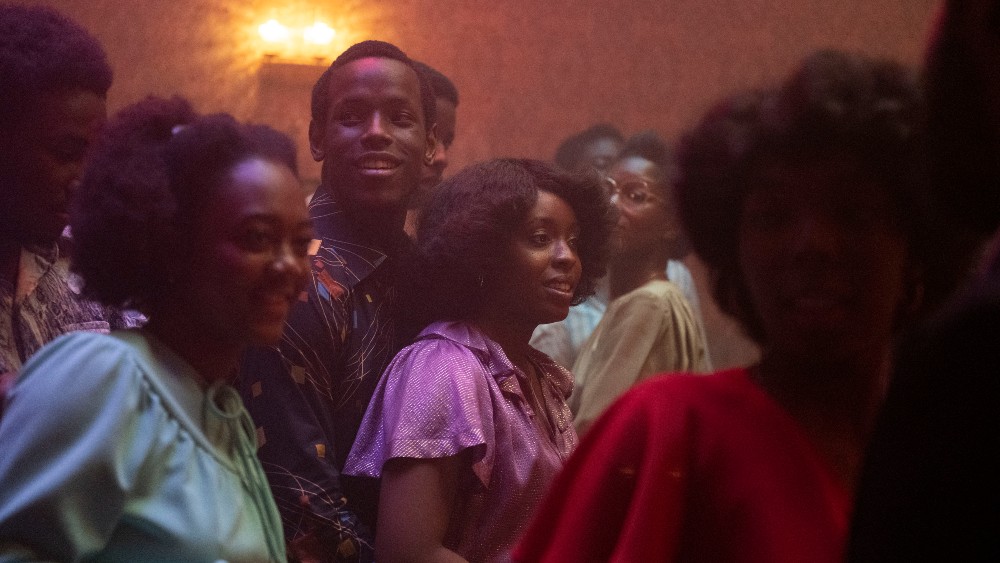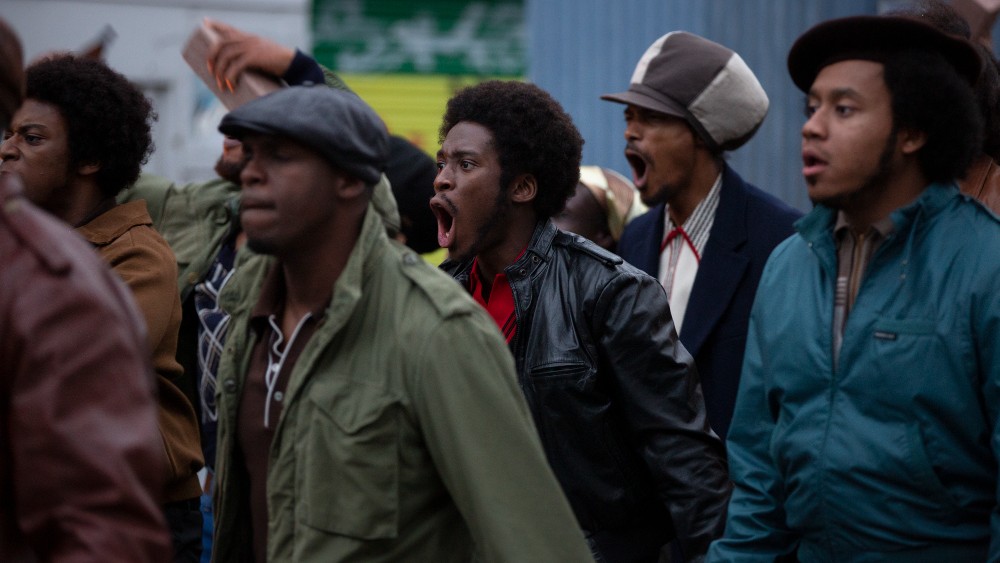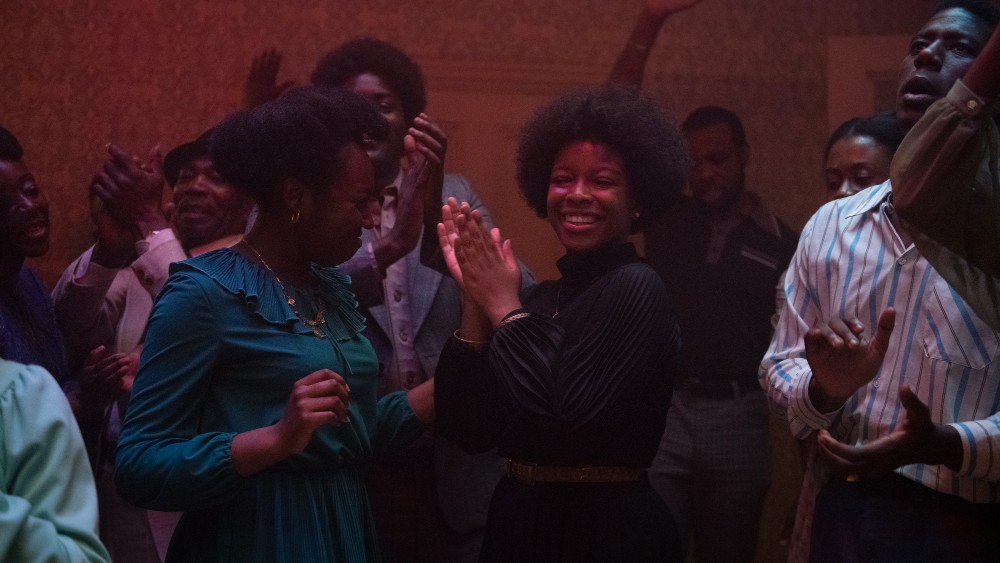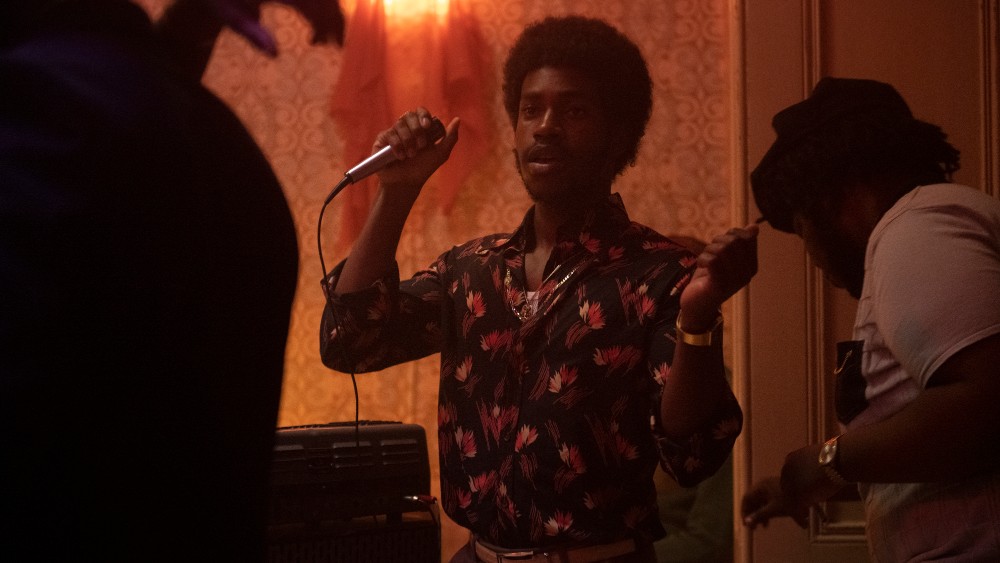
Every once in a while, an interview gets away from us, and that is definitely the case with this interview with Music Supervisor Ed Bailie, which was conducted way back in January when Steve McQueen’s Small Axe Anthology first streamed on Amazon Prime Video. But it was a great interview. In fact, if you were ever interested in the job of music supervisor, what they do and how they do it, then this interview is absolutely a must-read, since it’s highly informational, not just about Small Axe but also about the job of a music supervisor.
Of course, most of our discussion was about Lovers Rock, the segment of Small Axe that clearly has the most music, being a “blues night” dance party with so much great music from the early ‘70s, some songs more familiar than others. But we also touched briefly on other installments within McQueen’s anthology, because all of them required music to set the tone of the period.
In other words, everything discussed is still pertinent and timely whether you watched Small Axe a few months back or you finally get around to watching the five chapters today.
In fact, since this interview was conducted a few months back, the soundtrack record for Small Axe was recently released on vinyl by Motown Records as part of Record Store Day on June 12. You can also hear music from Small Axe, particularly for Lovers Rock, on special playlists on Spotify and Tidal.

Below the Line: You’re my first music supervisor, and I’m pretty excited about that. I first saw Lovers Rock at the New York Film Festival, and I had so many questions about the musical choices. I did interview Steve McQueen and asked him about that, but obviously, you were key to getting those songs and others for the Small Axe series.
Ed Bailie: Any conversation with Steve is always open to become a deep well of many incredibly interesting avenues. I’m not surprised that he barely managed to scratch the surface.
BTL: One of my questions to him was about whether he was able to get all the songs he wanted, but first, I’m curious about your background. I know that you worked in music publishing, but were you also a musician or composer?
Bailie: My background is music publishing. I’ve always studied music before then, but my professional career has always been on the business side. So I started out in publishing a few different things within the world of sync, which kind of leads you down the road into music supervision. There are people who tend to have record labels or publishing companies, production houses who make music. There are people who represent that music to basically pitch it into films, TV shows, advertising. We call it the sync departments, like synchronization, so those teams are the people that present back catalog and get it out to music supervisors, get it out to advertising, all that stuff. So I started out on that side of the fence at a company called Blue Mountain Music Publishing. Chris Blackwell, who started Island Records, it was his publishing company. So just quite interestingly, we were in Notting Hill, down the road from where the Mangrove Restaurant — which is the subject of the first film — was before it closed. The sort of people that I met working there were from the prime days of reggae being this huge genre. It will forever live on, but really, from its prime, we represented Bob Marley, Black Uhuru, Steel Pulse, Toots and the Maytalls, [just an] amazing catalog. So the whole thing was getting to meet Steve actually had nothing to do with that, but for me, it was just this really amazing fulfillment circle, because getting to work on something that is purely reggae and dub, or so heavy on reggae and dub. Those sorts of projects don’t come up that often, [so it] was a really amazing experience to tap into that stuff.
BTL: How did you end up meeting Steve?
Bailie: It’s not a particularly interesting story other than I’d actually worked on a lot of films and just kind of word of mouth, I suppose, and one of the producers on the production I’ve done a few productions with and Abi [Leland], who was my co-supervisor on this — we worked together. She had also worked on those films with him as well, the two of us had, so I was speaking with a familiar producer, and then he brought me into meet Steve during the shoot. I believe it was Red, White and Blue that was being shot at the time. I’d already torn apart the scripts and started work on things musically, but the first interaction with Steve was straight into the deep end. The train was on the rails that music was happening, the music was being placed, and we were moving forward. It was a straight-in kind of situation.
BTL: One of the things I learned from the Variety Music Supervisors Panel last year was that the music supervisor might be there from the script stage and are usually there until the very end, because it’s a constant job getting rights, etc.
Bailie: I mean, I’m still working on it. It’s definitely not first in, because there’s obviously people writing the scripts but certainly with Lovers Rock, because obviously, because 90% of the music is on camera. We had this blues party, it all happened, so we needed to clear all that music and make sure it was sorted out and viable before we shot, and then even with Mangrove, there’s still a lot of incidental music you probably wouldn’t clock, but we’ve got two steel bands, we’ve got two or three on-camera moments when a cast member sings. Even if they sing for 10 seconds, it’s a song that we’ve placed there and created. And that kind of happens throughout the anthology, the same amount in Education as kids singing “London’s Burning.” We’ve got to work out that small band and later on the teacher who is kind of excruciatingly, slowly playing a cover of “House of the Rising Sun” and forcing the kids to watch it, like their eyes are pried open in a Clockwork Orange way, as his ego is giving them a performance of what he wants to perform rather than actually teaching them. So all of these things are put in the script stage, and we need to sort it out — the case of having the songs that we want or maybe the one in the script is just a placeholder anyway. So we’ll work on that from really early on, and now, I can let you know that we’re working on a soundtrack album release, which I can’t share any data just yet, because we’re just working it out, but we’re working on a really nice package for that. There’s some beautiful exclusives on it as well, so I’m still in Small Axe mode, pulling together the vinyl, so the [put the tools down] moment hasn’t happened yet.
BTL: You mentioned when you met Steve, he was shooting Red, White and Blue, so had he already shot Lovers Rock, or had that not been shot yet?
Bailie: It hadn’t been shot. I’d need to double-check, but this was about 18 months ago. No, it was longer. Two years ago in a community hall not too far from my West London Northwest London, but the cameras were rolling, and it was just before we started shooting Lovers Rock, and then you end up doing some pickups. We did some little pickup shots on Red, White and Blue, the first production in the UK post-Covid lockdown actually to get cameras rolling again, just to do some pickup shots. We were really lucky that pre-lockdown like practically 100% of this film had been shot and made that was just some little pickups that needed to be done, but it still needed to kind of go through the hoops that everyone has in terms of Covid protocol.
BTL: It’s pretty amazing that he finished most of the shooting before Covid, because Mangrove alone is two hours long, and then you have over four more hours in the anthology, so it’s amazing it got done.
Bailie: And then in post, it’s just so dense, these songs. Even if some of them are shorter than feature-length, they’re certainly as narratively dense as a film and musically as dense as a film. Lovers Rock, we’ve got easily enough music for a few features. They felt like a canon of five films were being made, for sure.
BTL: Let’s talk about Lovers Rock, because you also had Dennis Bovell as a consultant for the music. Did Steve and Dennis have a lot of ideas about what they needed to get approved before they started shooting? What was that process like?
Bailie: Dennis is relatively local to me — we’re not too far from each other — and he’s a local legend, this man. He’s the kind of guy that pretty much anyone in local reggae or lovers rock [a style of reggae] or dub circles you speak to for some information. If I’m in a record store trying to get the right cuts from 1972 like for the scene in Alex Wheatle, when he’s in a record shop, and we want to kind of get some tracks that they would be playing in that record shop in that year in the early 80s. Pretty much anyone that you ask is always like, “Oh, you should speak to Dennis.” He’s that guy.
I had actually just come off a very small little recording project with Dennis, and I didn’t know I was working on Small Axe yet, so then Small Axe came in, and the first time I met Steve, I’d just been in the studio with Dennis about a month prior it was just like, “Do you know Dennis Bovell or want to meet him?” Straightaway, Steve was… because we had a couple of tracks we discussed a few tracks, most pivotally Janet Kaye’s “Silly Game,” which has that big moment where the cast sing a capella. As soon as we were talking about that, Dennis is attached to that song. Steve is like, “I absolutely would love to meet this guy, we’ve got to make it happen.” Dennis is up for it. They met at the production office in Kentish Town near Camden in London and had a hang-out and just kind of spoke about the time and memories, and I kind of left them to it.
Part of my job is to make introductions, finding songs creatively that work for scenes and collaborate on that if the director wants input on that, but also to kind of make connections and make recordings be able to happen and make on-camera performances be able to happen. And with Dennis, it was kind of like, “Okay, do that hook-up and then let them do their thing.” But throughout it, Dennis ended up being there. He wrote the cue in the Alex Wheatle film, actually. There’s a little bit of original music of his in there as well, a dub track. From Dennis’ personal experiences, because he ran London dub sets and was in Salford DJ and MC, and he’d be toasting the crowd and doing what you see our actors in Lovers Rock doing. We had Kadeem Ramsey and Alexander James Blake, who were the MCs — we called them Mercury Sound — they’re toasting the crowd all the way through Lovers Rock and changing the records and kind of getting the crowd going. Dennis did that at the time, so he became a really invaluable asset to be able to kind of help impart knowledge on these guys. “You do this, and why don’t you play that?” And he ended up [making a cameo]. Steve wanted him in there. He put him in two scenes as a really special Easter egg, because this guy is one of the fathers of lovers rock, and then he ends up in the film of the same name that has its heart in that genre. So yeah, it was a really nice connection.
BTL: I haven’t spoken to a lot of my British friends who have seen the show yet, but I imagine a lot of my American friends wouldn’t recognize him, and in fact, Lovers Rock was the first time I had heard “Silly Games.” “Kung Fu Fighting” was obviously pretty big here, but let’s talk some more about that scene. Being a DJ, a lot of it is being in the moment and creating the mood. How much harder is that when you’re shooting a film, and you have to make sure all the songs played have clearance?
Bailie: I think this is part of the magic of what Steve creates, because he has an almost — I’ll be careful how I say this, but an almost documentarian style to that film. It’s like you feel like a fly on the wall, you feel like you’re there, and one of the things I found most intriguing in one of the first meetings I had with Steve was that he asked someone there about blues parties. Did you go to these parties in the late ’70s? What were they like? What did they smell like? How smoky was the room? What did people go outside to smoke? What did it smell and taste like?” It’s like these two things that you cannot impart on a film in the most direct sense. You can watch a film, you can hear a film, but you can’t smell a film.
So then he was asking these questions, and finding ways around putting bodies in that room and making it feel like you’re there. He was building in his mind, I believe. Actually, it gets so warm in there, and there’s this shot of some sweat dripping down the wall, and then you can taste it, then you can really feel the room. All of that was just amazing to kind of watch, and I have no idea what’s going on behind the eyes when a director is kind of conjuring up how to paint that world on camera. The thing that I could witness was when he made that party, he didn’t do what a lot of people would do when they’re short on time, or they’re worried about the result of leaning on the edit. He went, “No, we’ll clear these tracks, and we’ll make this party,” and he got everyone’s energy up. He was the DJ in many ways on the shoot days, because he was getting the crowd going. He’s kind of going “Yeah! Yeah! Yeah” by just kind of toasting the crowd and getting everyone’s energy up. So everyone is dancing, everyone is singing. It’s acting, but it’s more that he’s actually creating the real party, and then he captures it on camera. So there’s no, “Let’s fix it in post, let’s change that track up, let’s tempo-match the dancing….” He made sure that the energy was there and created the moment. I think that’s why it works so well because it feels real, because it was real.
BTL: I know a lot of your job is the less than sexy thing of having to find the rights holders and negotiating all that stuff. How easy or harder is that nowadays? Obviously, if you’re looking for music, you can just go on Spotify and play a track and get some idea if you like it or not and if it works, but like “Silly Games,” how hard is it finding the people who have the rights for a song that’s 40 or 50 years old?
Bailie: You said that contracts aren’t sexy? [laughs] It’s definitely, definitely not the sexiest part. For this production, I was very heavily on the creative on Small Axe and making things happen, putting people together. It was a co-production with BBC, and they have an in-house music team, who predominantly handled the actual clearances of the tracks, but I worked really closely with their team to oversee that process and make sure that if songs aren’t looking like they’re gonna work out, I would help them try and find that person that they need to clear it with. In some instances, with old, rare cut b-sides like Cry Tuff and the Originals’ “Robin Hood Dub,” which is the very first track in Lovers Rock, right at the beginning of the film when they’re setting up the sound system. We’re trying to find someone in Jamaica, who is in the family of the original composer. Once we’d eventually worked out who the composer is, that it’s a dub cut of Jennifer Lara‘s “Music by the Score,” and that track then had a dub b-side, and the guy who produced it, Michael Williams, is Prince Far I, and then who is Prince Far I’s estate? So we’re slowly kind of digging down who to contact.
Sometimes, you’ve just got to give up on things and move on, because the rights are a bit sticky and a bit hard to demystify, because it’s years later, and contracts have been lost, or catalogs have been bought and sold. Someone will own it somewhere, but you might not have time to find who that person is before you need to lock the edit or hit record on camera. In general, it’s a big part of what we do. We have lots of resources to find our way to people and to problem-solve. It’s a really big part of filmmaking in many departments to problem-solve, and find out how we can get from A to B, without losing any of the creative vision along the way, without kind of just making do. We don’t want to just make do. We want to make it incredible, so you don’t want to cut corners. We don’t want to just kind of give up easily if you can’t find the rights-holder. There’s a lot of digging, and there were tracks that fell by the side, but I’m pretty confident that they then got replaced by things that we were all equally excited by.
It’s very much a genre. We talk a lot about Small Axe having a lot of reggae and dub, and there’s a lot of soul tracks, especially in Red, White and Blue, and a lot of pop tracks that just kind of set the era. You’ve got like The Pretenders are in there at one point, so it’s kind of a bit of a mix. In terms of the reggae and dub in Lover’s Rock, which is a big focus of the series. There are tracks which are covers or that are samples or has adopted a beat from an older track, and the rights have never been agreed, because permissions were never sought by the artists to adapted it or whatever. So there are some big songs you think would be viable, but then they turn out not to be, and sometimes, you gotta let go and move on. Because if people haven’t sorted that out in 35 years of disagreement, I don’t think we’re going to be able to fix it in three weeks before we wrapped the edit.

BTL: Having this background at Island Records who obviously were there at the time when reggae and dub was being introduced in England, so did you already know that something like Bob Marley might be too expensive. You obviously must know what’s viable from that library.
Bailie: Yeah, totally. I would say that the music supervisor’s role has to straddle creative, logistics, and budget. So you kind of have these three different things. They could be independent roles from each other, and sometimes they are in all kinds of scenarios. But we can have all the creative ideas and amazing ambitions, but not actually know whether we can afford it, or we can come up with amazing ideas for recording these orchestras in amazing halls, but not know the logistics of how we can get all of those people together to do it when the money isn’t there. So you kind of need those three interoperable bits to work to do it. You just kind of get a feel over time of, “You know what? Bob Marley is probably in this sort of range,” or maybe they’re not going to like this sort of scene. Or maybe so-and-so is going to like this or not like that. And then we just manage it as we go, because we have a total budget for the anthology or for the series or the feature film, and you need to make sure that it’s a bit of give and take. So in this episode, I’ve got 10 tracks, but in that one, I’ve only got two, and I can kind of balance out that we’re running over on that or “We would love to use that song on the end credits, it’s really huge. So we’ll allow the extra budget because then this other episode later on in the series has less.”
We’re always kind of spinning those plates. There are always going to be things that come up and surprise you. You know, some kind of unknown song you kind of pulled out of nowhere, but it’s owned by someone who really values that song and puts his finger on it. But you can’t be mad at those people. People kind of want something to be what it is. You just gotta kind of be like, “Okay, you value it that way. That’s totally cool. Now we need to make the decision whether we can financially justify sticking with it creatively, or whether creatively we actually need to move on now.” Sometimes, you need to do the latter, but I think on this, we were really lucky. We had the right balance, we had the right amount of time, and Steve really wanted a few Bob Marley cues in there, and we got to keep them, which was amazing.
BTL: I have to assume Steve understands this thing, because I’m sure if someone wanted to use like a scene from 12 Years a Slave on a TV set in a pub, he probably wouldn’t want that either.
Bailie: [laughs] No doubt he wouldn’t. He’s very humble — he just totally gets it. From my understanding, he gets it for all departments as well. He’s definitely not somebody who’s just gonna say, “Well, make it happen.” He’ll kind of adjust accordingly — it’s always a gracious process.
All five episodes of the Small Axe Anthology are available on Amazon Prime Video. If you happen to be in New York City, you actually can watch Lovers Rock on the big screen as part of Film at Lincoln Center‘s “Big Screen Summer: NYFF58 Redux” either tonight (Weds) at 9:15 pm or two screenings tomorrow (Thursday, June 24).
All photos courtesy Amazon.







